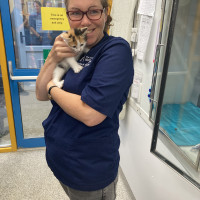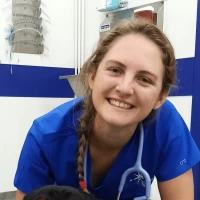As Christian vets, we believe we have the amazing privilege of fulfilling God’s command in Genesis 1 to care for all the animals and other living creatures created by God. The first vet school opened in the UK in 1791, and whilst there have been huge advances in medicine and science since then, the underlying responsibility and commitment to animal welfare remains the same. Studying to be a vet opens up a whole realm of possibilities - working in areas such as clinical practice, research, education, government, the military and industry. There are Christian vets working in all these fields, all seeking to be salt and light in their workplaces. How might God be calling you to spread his love through your studies?
Working for the wellbeing of creation
We read in Genesis 1:28, ‘Rule over the fish in the sea and the birds in the sky and over every living creature that moves on the ground’. As vets, we seek to do this with compassion and integrity, and as medical and scientific advances happen, we ask, ‘How can we use this for the flourishing, and not the harm, of God’s creation?’
Whichever avenue of work we take following graduation it will bring us into day-to-day contact with people - people who own and care for the animals we are treating, those whom we seek to educate, those for whom we frame legislation or endeavour to aid through our investigations – to them we are representing Christ.
In farm practice, our approach to ethical, efficient and environmentally friendly farming will affect the lives of producers and the consumers who are looking for affordable, reliable and safe food chains. In this often challenging and isolated environment how can we as vets shine Christ’s light?
As small animal vets, the pets we treat mean a range of different things to their different owners – companionship, vital assistance, status – and the way in which we approach their care speaks volumes about our standards and ethics. And that is all outside the discussions that may be had around which species are suitable to be called pets or which we can put into service on our behalf.
If you go into research, where might you stand in the debate over the use of animals in experimentation? Could you use your knowledge of animal physiology, anatomy or biochemistry to develop new non-animal testing systems that would still keep us safe from harm?
In the armed forces, you may have the opportunity to work with a variety of species - guard dogs, ceremonial horses, landmine detecting rats, etc. How do we ensure their safety and health?
What a joy it is that we can be part of God’s expression of care for His creation!
Worshipping the God we work for
As you progress through your studies you will come face to face with the intricacy of creation. You will time and time again have cause to wonder at the sheer variety of what God has made, and be able to say with the psalmist: ‘Your works are wonderful, I know that full well’. (Psalm 139:14). As we engage with veterinary studies we see more and more of who our Creator is, His heart for mankind and the natural world He made.
At the same time, there will be challenges to wrestle through as you study God’s creation. What is your attitude toward disease causing organisms? Why do they exist? Why does God allow them to cause pain and suffering? Scripture tells us that ‘Through him [the Word] all things were made; without him nothing was made that has been made.’ (John 1:3) How does this affect your worship of God?Nonetheless, as you study how the whole creation works together like the different parts of one body,you can’t help but appreciate the love that drove God to provide us with the diversity of life around us.
A veterinary course is also a great place to grow in dependency on God! There is so much good we can do for our patients and their owners, but ultimately their lives and wellbeing are in God’s hands. He is the one in control, and there’s no quicker way to better understand this than by being pushed to our limits daily. We can learn to trust Him more as we try to assimilate a wealth of information, apply it on EMS and later as new grads take responsibility for complex cases that stretch and challenge us medically and ethically, remembering that He alone is sovereign.
Witnessing to the world
Veterinary medicine is a course with many hours of lectures, practical work, seminars and placements, all of which gives you opportunities to get alongside people and demonstrate God’s love. The more we get to understand the intricacies of our bodies, and those of the (infinite) variety of beasts of the land, the sea and the air, the more we know that only a supreme being could create such marvels. As you study alongside those who don’t yet know Jesus, you have the opportunity to point them to this truth!
Jesus used animals as part of his storytelling in the parables on many an occasion – lost sheep, camels, goats – because people understood them and could relate to them. Perhaps these parables could be a good starting point for sharing your faith with your coursemates?
Both your studies and your future workplaces will bring you into contact with all sorts of people and the way in which you interact with them, the impression you leave behind can show them the love of Christ and be a witness to them.
What’s more, vets are needed all over the world! Your training could be a gateway to overseas mission. In particular, it could allow you to live and work as a Christian in places where the gospel can’t be shared freely.
Keep going, Christian vet student!
The veterinary degree can be a very challenging journey at times, but it is also a fantastic experience where you often make friends for life and a great time to stretch and grow in your faith. As the Veterinary Christian Fellowship we are passionate about supporting students through their studies and beyond, to help you grow in your faith, help you find EMS placements through the EMS database, financially and prayerfully assist in outreach at universities, and continue to pray, love and support as you move into the workplace.
Reflect and discuss
Think: Think back over what you have studied so far in your degree. Where have you seen God's fingerprints? Where have ideas presented to you challenged what you believed to be true?
Live: What do you think your coursemates would know about what is important to you from the way you live? Is there anything you want to change here?
Speak: Are there topics in your subject that are closer to talking about your outlook on life, God or the gospel? Pray for people on your course and for opportunities to share about Jesus with them this term.
Taking it further
- Join the Veterinary Christian Fellowship to meet fellow Christians who know and understand the particular pressures and joys of the vocation. Share in conferences, fellowship groups, mentoring partnerships and contribute from your own experience of your relationship with God.


